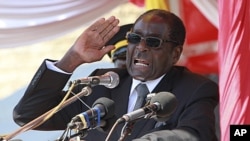Zimbabwe's President Robert Mugabe has long pushed for all foreign and locally-owned companies to be at least 51 percent owned by black Zimbabweans. But legislation to advance that goal is having a hard time getting through the country's legislature. A multiparty legal committee has rejected draft laws on mine ownership and is set to send other so-called "indigenization" rules back to the drawing board.
Zimbabwe’s parliamentary legal committee has ruled that sections of new laws on “indigenization" of the mining sector violate the constitution and has sent them back for re-drafting.
This is the second time that the proposed laws, which have caused anxiety in Zimbabwe’s private sector, have been found to contravene the heavily amended constitution or other laws.
A parliamentary watchdog group, Veritas, reports the legal committee found the draft law infringed on the constitutional guarantee of freedom of choice, because the government sought to compel mining companies to transfer shares to partners it specified.
It also said the committee rejected the mandatory acquisition of shares by the state without provision for compensation.
The legal committee previously rejected the regulations for seeking to impose a heavy fine and jail terms of up to five years on companies which failed to submit indigenization plans on time.
The regulation was changed to say directors of companies should be liable. But "Veritas" says this will also be rejected when it comes before the legal committee, because office bearers can not be liable for a criminal offense committed by their organization if it is shown they took no part in the offense.
There are very few whites left in business in Zimbabwe and many top black management executives objected to the vision of company ownership promoted by President Mugabe's ZANU-PF party.
Most economists say indigenization as originally proposed would inhibit foreign investment and domestic expansion at a time when the economy is still suffering wounds inflicted by the economic policies of the previous ZANU-PF administration.
About 60 percent of industries closed during the last five years of ZANU-PF rule, which ended in February 2009 when an inclusive government was formed.
The Movement for Democratic Change party of Prime Minister Morgan Tsvangirai narrowly won parliamentary elections in 2008.
ZANU-PF’s indigenization minister, Saviour Kasukuwere, was not available for comment Wednesday.
Insiders from the mining sector say about 170 mining companies submitted plans for indigenization earlier this year but that most proposed indigenous ownership of no more than 30 percent.
Zimbabwe Lawmakers Reject ‘Indigenization’ Regulations




